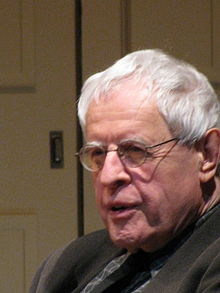Loading AI tools
Serbian-born American poet (1938–2023) From Wikipedia, the free encyclopedia
Dušan Simić (Serbian Cyrillic: Душан Симић, pronounced [dǔʃan sǐːmitɕ]; May 9, 1938 – January 9, 2023), known as Charles Simic, was a Serbian American poet and co-poetry editor of the Paris Review. He received the Pulitzer Prize for Poetry in 1990 for The World Doesn't End and was a finalist of the Pulitzer Prize in 1986 for Selected Poems, 1963–1983 and in 1987 for Unending Blues. He was appointed the fifteenth Poet Laureate Consultant in Poetry to the Library of Congress in 2007.[1]
Charles Simic | |
|---|---|
 Simic in 2015 | |
| Born | Dušan Simić May 9, 1938 Belgrade, Yugoslavia |
| Died | January 9, 2023 (aged 84) Dover, New Hampshire, U.S. |
| Occupation | Poet |
| Education | New York University (BA) |
| Notable awards |
|
Dušan Simić was born in Belgrade. In his early childhood, during World War II, he and his family were forced to evacuate their home several times to escape indiscriminate bombing of Belgrade. Growing up as a child in war-torn Europe shaped much of his worldview, Simic stated. In an interview from the Cortland Review he said, "Being one of the millions of displaced persons made an impression on me. In addition to my own little story of bad luck, I heard plenty of others. I'm still amazed by all the vileness and stupidity I witnessed in my life."[2]
Simic immigrated to the United States with his brother and mother to join his father in 1954, when he was sixteen. After spending a year in New York, he moved with his family to Oak Park, Illinois, where he graduated from high school.[3] In 1961, he was drafted into the U.S. Army, and in 1966, he earned his B.A. from New York University while working at night to cover the costs of tuition.[4]
Simic began to make a name for himself in the early to mid-1970s as a literary minimalist, writing terse, imagistic poems.[5] Critics have referred to Simic's poems as "tightly constructed Chinese puzzle boxes". He himself stated: "Words make love on the page like flies in the summer heat and the poet is merely the bemused spectator."[6]
He was a professor of American literature and creative writing at University of New Hampshire beginning in 1973[7][8] and lived in Strafford, New Hampshire.[9] Simic wrote on such diverse topics as jazz, art, and philosophy.[10] He was influenced by Emily Dickinson, Pablo Neruda, and Fats Waller.[11] He was a translator, essayist, and philosopher, opining on the current state of contemporary American poetry. He held the position of poetry editor of The Paris Review and was later replaced by Dan Chiasson. He was elected to the American Academy of Arts and Letters in 1995, received the Academy Fellowship in 1998, and was elected a chancellor of the Academy of American Poets in 2000.[12]
Simic was one of the judges for the 2007 Griffin Poetry Prize and continued to contribute poetry and prose to The New York Review of Books. He received the US$100,000 Wallace Stevens Award in 2007 from the Academy of American Poets.[13]
Simic was selected by James Billington, Librarian of Congress, to be the fifteenth Poet Laureate Consultant in Poetry to the Library of Congress, succeeding Donald Hall. In choosing Simic as the poet laureate, Billington cited "the rather stunning and original quality of his poetry".[14]
In 2011, Simic was the recipient of the Frost Medal, presented annually for "lifetime achievement in poetry".[15]
Simic's extensive papers as well as other material about his work are held at the University of New Hampshire Library Milne Special Collections and Archives.[16]
Simic married fashion designer Helene Dubin in 1964, and their union produced two children. In 1971, he became an American citizen.[17] Simic died of complications of dementia on January 9, 2023, at age 84.[18][19]
| Title | Year | First published | Reprinted/collected |
|---|---|---|---|
| Left out of the Bible | 2021 | Simic, Charles (May 31, 2021). "Left out of the Bible". The New Yorker. 97 (14): 45. | |
| Windy day | 2021 | Simic, Charles (September 20, 2021). "Windy day". The New Yorker. 97 (29): 65. |
Seamless Wikipedia browsing. On steroids.
Every time you click a link to Wikipedia, Wiktionary or Wikiquote in your browser's search results, it will show the modern Wikiwand interface.
Wikiwand extension is a five stars, simple, with minimum permission required to keep your browsing private, safe and transparent.